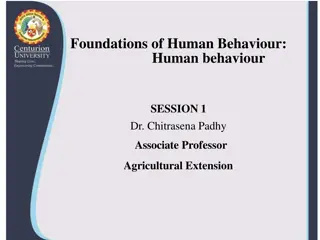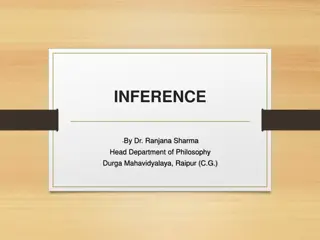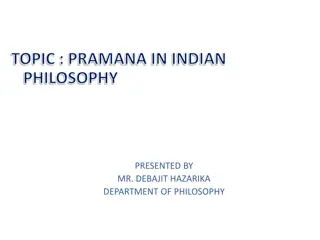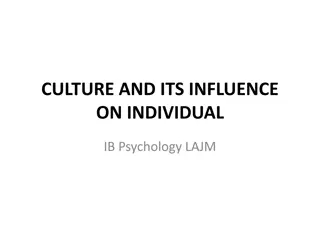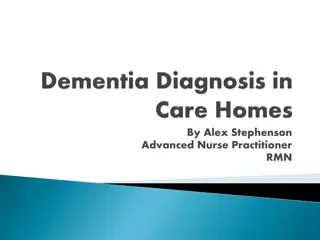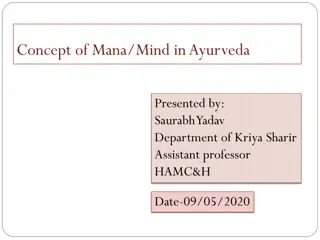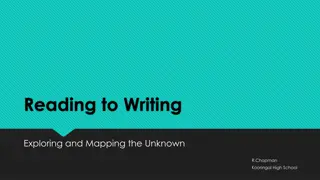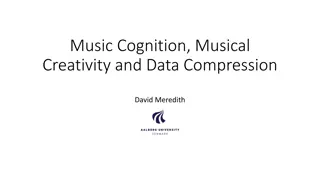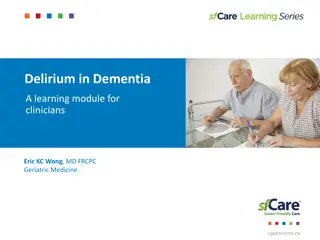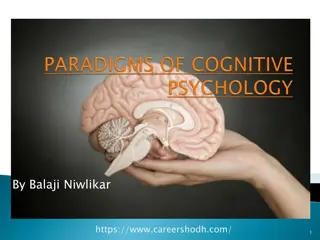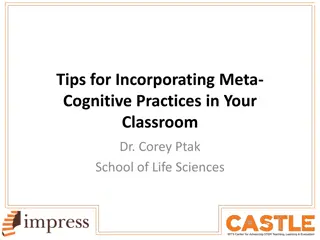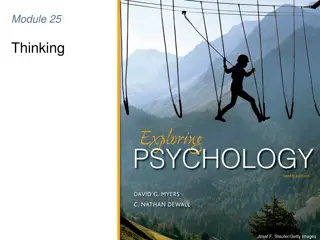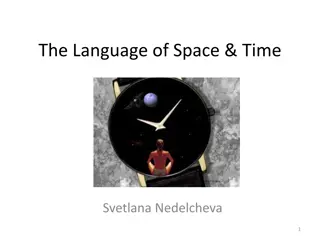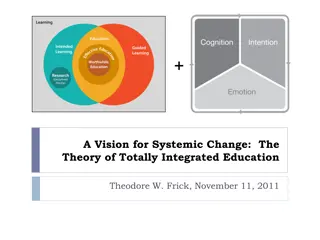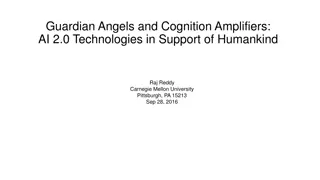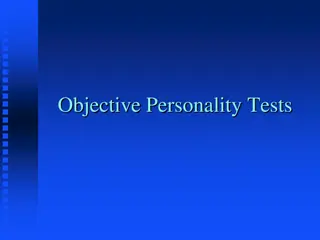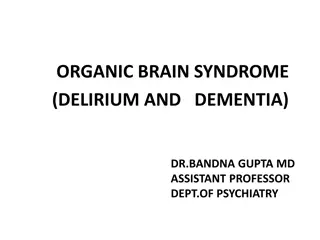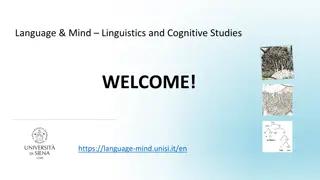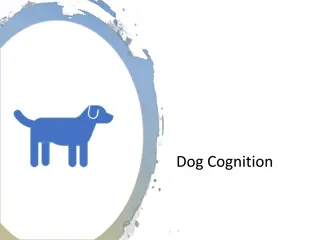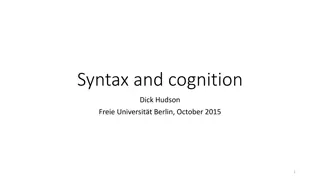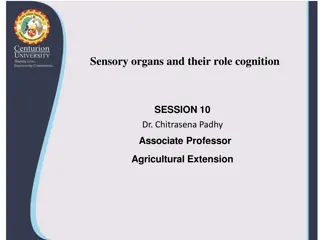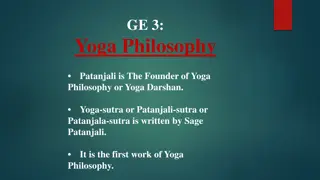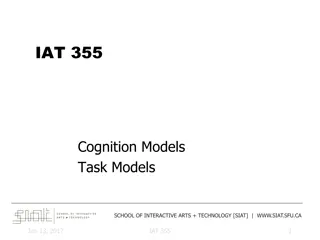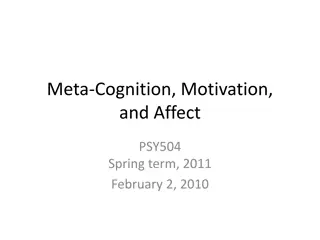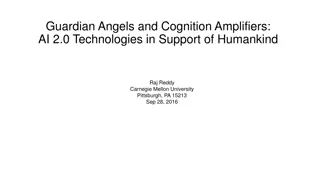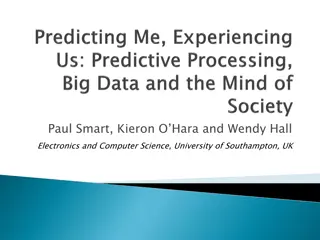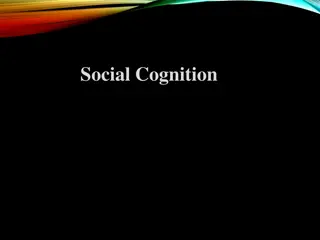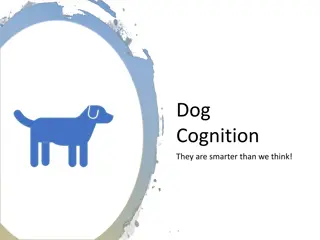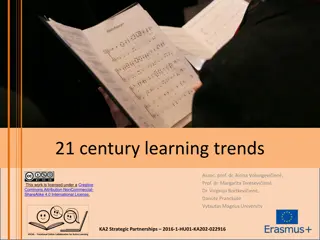Understanding Human Behavior: Foundations and Complexity
Human behavior encompasses the actions and interactions of individuals influenced by factors like genetics, culture, and situational contexts. It involves observable overt behaviors as well as hidden covert behaviors, with a dynamic interplay between individuals and their environments. Psychologists
8 views • 20 slides
Understanding Inference in Indian Philosophy
In Indian philosophy, inference is considered one of the six ways to attain true knowledge. It involves three constituents: Hetu (middle term), Sadhya (major term), and Paksha (minor term). The steps of inference include apprehension of the middle term, recollection of the relation between middle an
11 views • 8 slides
Understanding Mechanistic Interpretability in Neural Networks
Delve into the realm of mechanistic interpretability in neural networks, exploring how models can learn human-comprehensible algorithms and the importance of deciphering internal features and circuits to predict and align model behavior. Discover the goal of reverse-engineering neural networks akin
6 views • 31 slides
Implicit Bias in Dance: Exploring Unconscious Beliefs and Behaviors
Explore implicit bias in the context of dance research through the lens of unconscious beliefs affecting judgments, behaviors, and social interactions. The discussion delves into the impact of implicit cognition on various aspects like self-esteem, social judgment, decision-making, and prejudice, hi
0 views • 16 slides
Understanding Pramana in Indian Philosophy by Mr. Debajit Hazarika
Philosophy delves into the quest for knowledge, with Epistemology exploring sources and validity. In Indian philosophy, Prama signifies true cognition, attainable through Pramana - the means to achieve valid knowledge. This discussion covers the six pramanas within various philosophical systems and
2 views • 11 slides
Understanding the Impact of Culture on Behavior and Cognition in IB Psychology
Explore the diverse facets of culture's influence on individual behavior and cognition in IB Psychology through topics like cultural origins, norms, and Hofstede's dimensions. Dive into mind mapping, textbook comparisons, and research studies to grasp the profound effects of culture on human psychol
2 views • 41 slides
Understanding Dementia and Memory Assessment Services
Chronic and progressive syndromes like Alzheimer's disease affect cognition and functional skills in older adults. Various types of dementia bring about changes in memory, communication difficulties, mood changes, and more. Cognitive testing and advanced care planning play crucial roles in managing
0 views • 9 slides
Understanding the 3 Ts of Trauma: Trajectory, Treatment, and Trust
This comprehensive guide delves into the critical aspects of trauma - Trajectory, Treatment, and Trust. It covers the definition of trauma, PTSD symptoms, potentially traumatic events, trajectories of traumatic stress, and the impact of trauma on mental health. Explore the effects on behavior, biolo
0 views • 29 slides
Understanding Anxiety Disorders and Related Conditions
Explore the distinguishing features of anxiety disorders such as generalized anxiety disorder, panic disorder, and phobias, along with insights into obsessive-compulsive disorder (OCD) and posttraumatic stress disorder (PTSD). Delve into the impact of conditioning, cognition, and biology on these co
2 views • 46 slides
Understanding the Concept of Mana/Mind in Ayurveda
The concept of Mana or Mind in Ayurveda is explored, discussing its etymology, definition, and functions. Mana serves as the mediator for understanding, perception, and cognition, influencing actions and decisions based on its objects, such as Chintya and Vicharya. It plays a crucial role in control
0 views • 50 slides
Decoding Symbolic Thinking: Exploring the Power of Symbols in Learning and Perception
Delve into the world of symbolic thinking through the eyes of renowned artist René Magritte and explore how symbols shape our perception and understanding of the world. From dissecting Magritte's iconic painting to unraveling the intricacies of language as a symbolic system, journey through the int
2 views • 15 slides
The Relationship Between Music, Cognition, and Data Compression
Music composition involves creating novel music for specific audiences. When we listen to music, our brain processes sound data through compression, seeking patterns and relationships to understand and appreciate the music better. This cognitive process is crucial for perception, cognition, and crea
0 views • 12 slides
Understanding Delirium in Dementia for Clinicians
This learning module provides clinicians with insights into the relationship between delirium and dementia, how to distinguish between the two conditions, practical approaches to assessing delirium in dementia patients, treatment implications, and a structured method for delirium detection using cas
0 views • 29 slides
Exploring Paradigms of Cognitive Psychology
Cognitive psychology, a branch of psychology, delves into mental processes like thinking, perceiving, remembering, and learning. This field views individuals as information processors, with paradigms guiding research methodologies. Key approaches include Information Processing, Connectionist, Evolut
0 views • 18 slides
Få dina bekymmer lösta med Nicecargbg.coms experttjänster för fordonsbesiktnin
F\u00e5 dina bekymmer l\u00f6sta med Nicecargbg.coms experttj\u00e4nster f\u00f6r fordonsbesiktning i G\u00f6teborg. Lita p\u00e5 oss f\u00f6r att s\u00e4kerst\u00e4lla din bils tillf\u00f6rlitlighet och s\u00e4kerhet.
3 views • 1 slides
Enhancing Learning Through Metacognitive Practices
Explore the significance of metacognition in education, including understanding metacognitive processes, knowledge of cognition, regulation of cognition, benefits for students, importance of self-reflection, and exercises that promote metacognition such as retrospectives and exam wrappers. Discover
0 views • 13 slides
Analysis of Disability Statistics Guidelines and Indicators (80 characters)
Guidelines and indicators for analyzing disability statistics are presented, covering difficulties in vision, communication, hearing, cognition, mobility, lifting, and upper body functions. Data from various surveys provide insights into the prevalence and severity of disability challenges. The imag
0 views • 16 slides
Understanding New Jersey Mature Driver Challenges
New Jersey has a significant population of mature drivers aged 65 and older, accounting for 21% of licensed drivers. The proportion of crashes involving mature drivers has increased, with over 17% occurring in 2020. Vision, hearing, cognition, and physical condition changes with aging impact driving
0 views • 51 slides
Understanding Cognition and Decision Making
Cognition encompasses mental activities like thinking, knowing, and remembering, while concepts simplify thinking by grouping similar objects. Cognitive strategies and obstacles in problem-solving, such as algorithms and confirmation bias, also play a crucial role. The "Aha!" moment reflects sudden
0 views • 15 slides
Exploring the Embodied Nature of Human Cognition
Exploring the concept of embodied cognition, this content delves into how human perception and understanding are shaped by physical experiences and interactions with the world. From spatial scenes to the containment concept, it highlights the fundamental role of the body in shaping our cognitive pro
0 views • 37 slides
Enhancing Education Through Totally Integrated Approach
Theodore W. Frick's Theory of Totally Integrated Education (TIE) emphasizes aligning student cognition, intention, and emotion with authentic learning tasks to create worthwhile education. TIE focuses on systemic change in education and provides a vision for improving learning outcomes by connecting
0 views • 55 slides
Guardian Angels and Cognition Amplifiers: Enhancing Human Intelligence with AI 2.0 Technologies
Harnessing the power of AI 2.0 technologies, Guardian Angels and Cognition Amplifiers (Gats and Cogs) augment human intelligence by continuously monitoring user activity patterns and intentions through smartphone sensors. These tools enable automation of daily activities, personalized assistance, an
0 views • 27 slides
Neuromorphic Computing: Bridging the Gap Between Silicon and Human Cognition
This research delves into neuromorphic computing, a cutting-edge field that merges principles from biology and silicon technology to advance cognitive processing. The study explores top-down approaches, drawing inspiration from the auditory cortex for DNS, and bottom-up strategies to enhance CPU arc
0 views • 17 slides
Understanding Social Neuroscience: Exploring Human Sociality and Well-Being
Social neuroscience delves into how the brain processes social interactions and their impact on human well-being. It focuses on the interconnectedness between social connections and overall life satisfaction, suggesting that humans are inherently social beings with a strong need for social belonging
2 views • 21 slides
Understanding Objective Personality Tests and Traits
Explore various objective personality tests and traits, including examples of uni-dimensional traits such as Locus of Control, Type A/B personalities, Tolerance for Ambiguity, Need for Cognition, Bem Sex-Role Inventory, and more. Delve into the concepts introduced by psychologists like Julian Rotter
0 views • 14 slides
Understanding Organic Brain Syndrome & Delirium
Overview of organic brain syndrome and delirium, including definitions, clinical features, and management. Delirium, a common psychiatric syndrome, affects consciousness, cognition, and perception, leading to increased morbidity and mortality. Recognize core symptoms, such as disturbances in conscio
0 views • 37 slides
Master in Language and Mind: Interdisciplinary MA Program at University of Siena
The Master in Language and Mind is an interdisciplinary program focusing on language as a human cognitive capacity, offering two curricula in Linguistics and Cognition and Philosophy and Cognition, with opportunities for double degree programs and collaborations with international universities.
0 views • 21 slides
Dog Cognition: Understanding the Advanced Cognitive Abilities of Dogs
Exploring the fascinating realm of dog cognition reveals how dogs exhibit advanced cognitive abilities beyond that of many non-human primates. From social learning to strong discrimination learning, contingency reversal, and object manipulation, dogs showcase remarkable intelligence that continues t
0 views • 35 slides
Evolution of Syntactic Theory: From Psychology to Cognition
Syntactic theory has evolved significantly, influenced by psychology and cognition. The debate between phrase structure and dependency structure continues, with a shift towards integrating cognitive principles. Cognitive linguistics, including Cognitive Grammar and Construction Grammar, play a key r
0 views • 31 slides
Understanding the Role of Sensory Organs in Cognition
Leonardo da Vinci emphasized the significance of the five senses in experiencing life fully. Our sensory organs - sight, smell, hearing, touch, and taste - play vital roles in transmitting information to the brain for interpretation. Each sense has distinct functions essential for perceiving and und
0 views • 9 slides
Understanding Yoga Philosophy: Insights from Patanjali's Yoga Sutra
Yoga philosophy, founded by Sage Patanjali, explores the union of mind and body through practices like Viveka and Cittavritti. The Yoga Sutra delves into stopping mental modifications and identifies five types of Cittavrittis. These include Pramana (valid knowledge), Viparyaya (false cognition), Vik
0 views • 26 slides
Cognition Models in InfoVis: Understanding Knowledge Creation Process
Visualization plays a key role in aiding cognition by supporting knowledge creation and seeking tasks through process models and task taxonomies. Understanding the cognitive aspects of information visualization is crucial for aiding comprehension and knowledge understanding, as demonstrated by the u
0 views • 41 slides
Early Learning Guidelines for Language, Literacy, and Cognition
Explore the developmental milestones in language, literacy, and cognition for children ages 0 to 5 through various standards and guidelines, including WA Early Learning Guidelines, Teaching Strategies Gold, Common Core State Standards, and more. Encourage play, storytelling, writing, and communicati
0 views • 6 slides
Enhancing Understanding of Meta-Cognition, Motivation, and Affect in Psychology Classes
The content discusses survey responses and feedback on a psychology class focused on meta-cognition, motivation, and affect. Students shared insights on the best and worst parts of the discussions, highlighting the importance of staying on topic. The format of lectures followed by discussions was al
0 views • 53 slides
Guardian Angels and Cognition Amplifiers: Transforming Human Intelligence with AI 2.0 Technologies
This explores the integration of AI technologies to enhance human cognition through the creation of personalized Guardian Angels (Gats) and Cognition Amplifiers (Cogs). These tools leverage multimodal sensors on smartphones to monitor activities, infer intentions, and automate daily tasks. The syste
0 views • 27 slides
Understanding the Brain's Predictive Processing and Cognitive Architecture
Exploring the fascinating realm of brain function and cognition, this content delves into topics like deep learning systems, big data implications, the predictive nature of the brain, cortical hierarchy, active inference, generative models, and cognitive architectures explaining various mental condi
0 views • 21 slides
Understanding Social Cognition and Schemas
Social cognition explores how people perceive and interpret social information, using automatic and controlled thinking processes. Schemas are mental structures that help us organize knowledge about the social world, affecting how we remember, interpret, and act upon information. The self-confirming
0 views • 23 slides
Unveiling the Intelligence of Dogs: A Closer Look at Dog Cognition
Dogs possess remarkable cognitive abilities that surpass common beliefs. With a strong capacity for social and nonsocial learning, discrimination, contingency reversal, object permanence, categorization, and inferential learning, dogs exhibit behaviors indicative of advanced cognitive-emotional capa
0 views • 35 slides
Måleri i Södertälje och Södermalm: Professionella Tjänster för Ditt Hem och Före
N\u00e4r du t\u00e4nker p\u00e5 m\u00e5leri, kanske du f\u00f6rst kommer att t\u00e4nka p\u00e5 hur f\u00e4rg kan f\u00f6rvandla ett rum eller ge liv \u00e5t ett hus. I st\u00e4der som S\u00f6dert\u00e4lje och S\u00f6dermalm spelar m\u00e5leritj\u00e
0 views • 6 slides
Emerging Trends in 21st Century Learning Pedagogies
Higher education faces the challenge of adapting to a changing world at the turn of the 21st century. Innovative learning pedagogies such as distributed cognition, personalization, openness, student-generated content, and interactive learning are key in preparing institutions for future competitiven
0 views • 21 slides
